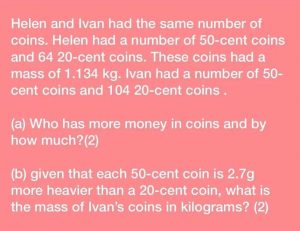
We have all heard about the recent Math question on Helen’s and Ivan’s coins that was exceptionally difficult for Primary School Leaving Examination (PSLE) students this year.
Students were crying; parents were angry. Many complaints and rants were made on social media platforms and discussion forums.
There was so much buzz about it that corporate brands jumped on the bandwagon to draw attention by including the question’s context in their marketing materials.
A Rising Trend

This isn’t the first time that such questions have appeared in our national exams, as it seems that our joint examining authorities — Singapore Examinations and Assessment Board (SEAB), Ministry of Education (MOE) and Cambridge Assessment International Education — have been purposefully inculcating exceptionally difficult questions for their recent papers.
Earlier in 2021, there was also an uproar regarding the N-Level English Listening Comprehension examination, in which students complained that the speakers were switching between Australian, British and Swedish accents, and were speaking at very fast speeds.
It is prevalent that the examining authorities are moving towards real-life application in their examinations and are inculcating international accents to simulate the onset of globalisation.
Some students have commented that they “didn’t find anything weird with the accent”, which hinted that maybe, this new concept might be doable for some.
Impact on Students’ Mental Well-being

Are the examining authorities overlooking the impact that this system might have on the students and their mental wellbeing?
In our competitive society, we all know how important the national exams are to students and their parents in Singapore. They play a crucial role in the student’s future.
Day in and out, students spend a lot of their time preparing for these major exams. They go for back-to-back tuition classes, are overloaded with homework and revision, all to prepare for that one exam.
Their parents are also paying an arm and a leg for their child’s tuition classes and worrying about whether they are going to do well enough. It is vital to acknowledge that many students and their parents are chasing perfection for the major examinations and may not take it well, even if it is just a single question that the student can’t solve.
According to CNA, “suicide numbers for those aged 10 to 29 had gone up from 23 in 2019 to 30 in 2020, an increase of 30.4 per cent.”
The rising number of suicide among youths in Singapore highlights the overwhelming stress and their inability to handle the expectations pinned on them at such a young age.
“Suicide is still the leading cause of death for young people aged 10 to 29 years old”, as stated in the PleaseStay.Movement.
Should the examining authorities be considering the stress that students are already facing?
Are These Attempts to Sieve Out the Elite?

Whether or not the student can solve that exceptionally difficult question could push them from one grade to another. Some may say that these are efforts from the examining authorities to sieve out the elite, but is this really necessary?
The purpose of examinations seems to have wavered over the years, and is no longer to merely test and ensure that students have understood the learning required for their level.
It now pushes students past their limits and demands their critical thinking skills, identifying the cream of the crop with the competition for the best grade.
The uncertainty of these exceptionally difficult questions gives students an added sense of anxiety with the questions being so unexpected and impossible to prepare for. Furthermore, the Math Paper was only on the second day of their written PSLE papers and might have really affected students for the rest of their papers.
Could a harmless attempt to sieve out the elite have more serious consequences?
Is There Now More Emphasis on Application Skills?

On the other hand, is it really a good and safe practice to allow students to prepare for repeated scenarios?
Students are so used to preparing for the same type of questions, that they could more or less memorise the types of expected questions and how to solve them.
The new type of questions, though seemingly difficult, are actually disguised tests on students’ application skills. Students will need a thorough and in-depth understanding of the concepts that they have learnt in order to apply them in these complex questions.
These questions may seem very complicated, but are definitely able to be solved with the knowledge of the concepts that their standard is supposed to have. It just requires a higher level of thinking.
It seems that the examining authorities are preventing the regurgitation of repetitive and overused questions, and are beginning to test the students’ true understanding of concepts instead.
This could train their adaptability and flexibility when it comes to solving problems.
Ease of Online Discussions Among Students and Parents

It is now a common practice for parents, teachers and tutors to be very in touch with the trends and the questions set, as past year papers are easily accessible on websites.
At the end of every paper, the questions will be circulated immediately and parents, teachers and tutors will scramble to solve for the answers to these questions. Within a few hours, the suggested answers can be conveniently found online.
It is also typical for parents to take it to group chats and online forums (e.g. Reddit, KiasuParents) to discuss their children’s academic matters all year long, and they will definitely flood these platforms at the end of their child’s every paper to review the questions and answers.
This competitiveness tempts parents and students to compare and check if they have/their child has solved the question correctly, creating an obsession over their performance even though the paper is already over and they can’t make any more changes.
These platforms can also orchestrate the influence of opinions. If everyone seems to say that the question was easy, the parent/student might blame themselves. If everyone says that the question was difficult, everyone would blame the paper.
With the existence of these platforms, parents and students are fixating on perfection for their major exams. Are they causing self-added pressure?
Advice for Parents

Especially with PSLE-taking children being so young, parents are the main pillar of support for them.
As a parent, you can help your child ease their worries by aiding them in their preparation for their major exams.
With any new trend, it is necessary to analyse it. There is no way that you can predict exactly how they will present the difficult question in every exam, but you can study the types of questions and the concepts that are being tested.
It is now also necessary to ensure that students fully understand the concepts and not just memorise the type of questions that have been reappearing over the years.
In order to prepare their children for the ever-changing question types in major examinations, many parents opt to send their children for tuition or enrichment classes, so that they don’t have to worry about keeping up with the syllabus.
Since critical thinking skills are becoming increasingly important in order for students to ace their national exams, parents are also sending their children to brain development enrichment schools, which can be extra costly.
Otherwise, encourage them to think out of the box when they are solving problems.
Conclusion

The world is changing and so is our examinations for the students. Although frightening, change is necessary and adjustment has to follow. Parents, teachers, tutors and students have to adjust accordingly to the changes in their syllabus, as stagnance is also a recipe for failure.
Learning to face challenges and tackle problems are essential milestones for every child, and grades should not be the be-all and end-all.
Even if they did not attain an ‘A’ grade because they didn’t know how to solve an exceptionally difficult question, it does not define them, but rather signify room for improvement in their critical thinking skills.
Are these exceptionally difficult questions a good step taken by the examining authorities? Do they serve as a healthy challenge for students, or are they out to kill?
Leave your thoughts about this in the comments section below!
